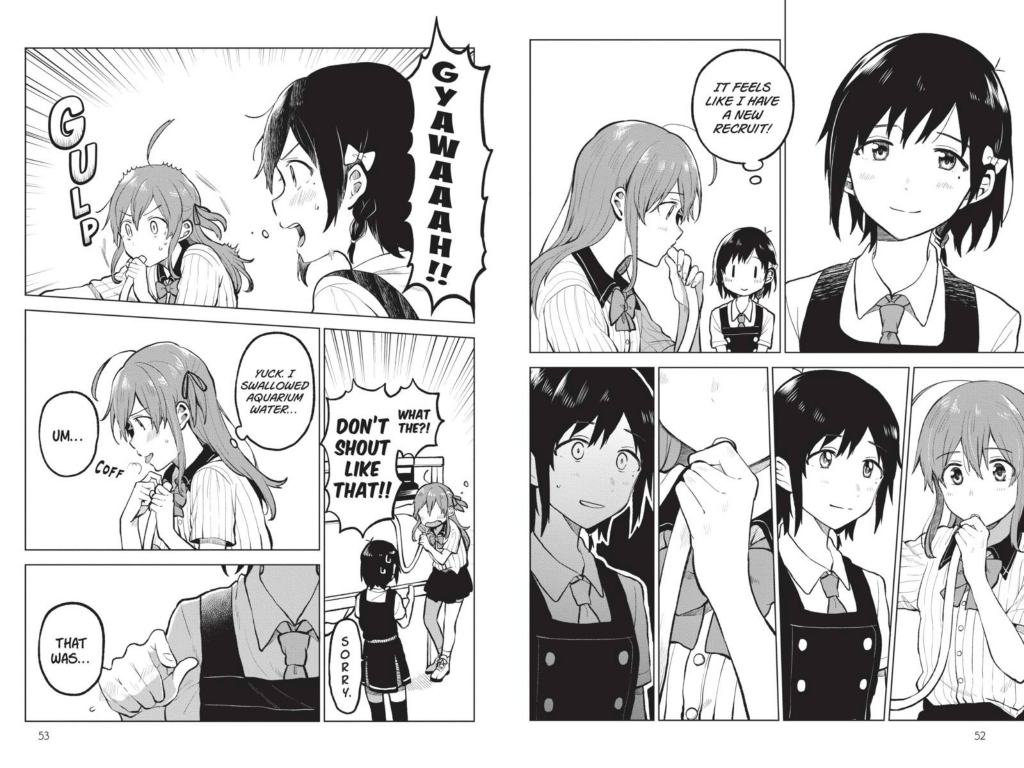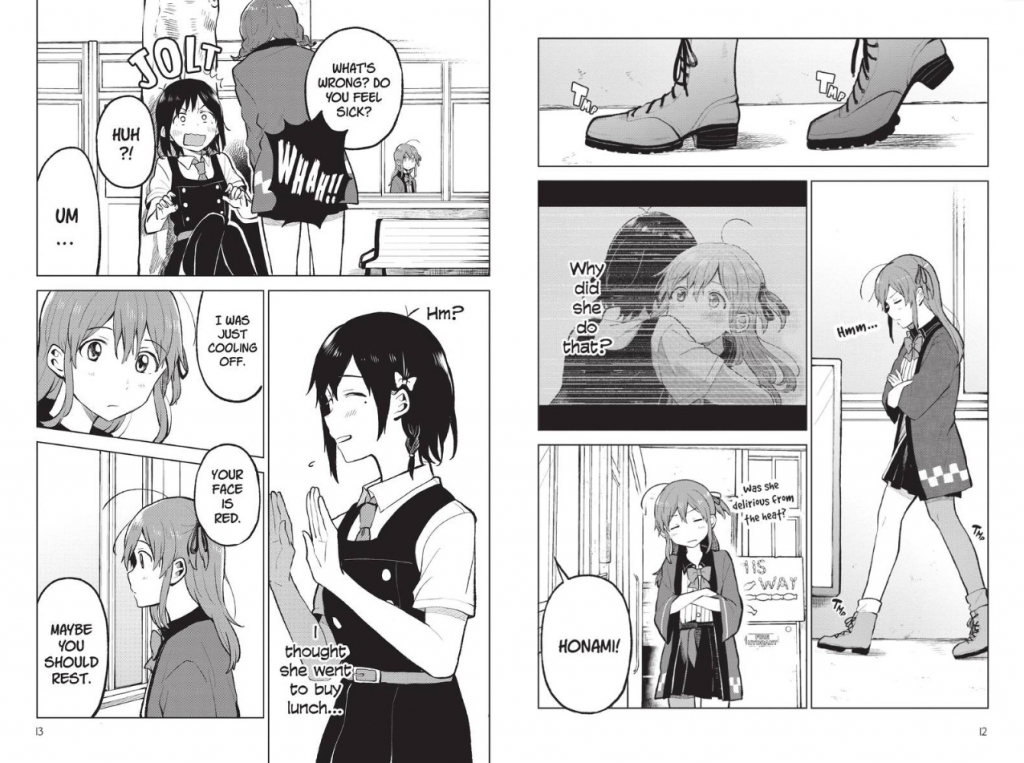

Earlier this month, we took a week to look at kid-lit comics, comics written for a younger audience, but still meaningful for all readers. Much of the manga published in the United States could actually fall in this category – manga megahits like Naruto and Fruits Basket ran in magazines aimed at children, although their core Japanese audiences have slowly aged over time. One of the major themes of kids-lit is that of self-discovery and growth, and that theme is just as prominent in manga as it is in comics like Laura Knetzger’s Bug Boys and Jen Wang’s Stargazing.
Self-discovery and growth is an area ripe for art-making, and I have been encouraged by a recent flourishing of these stories in manga about people who are LGBTQIA. A Tropical Fish Yearns for Snow is one of these stories; it’s a story of two girls, the school aquarium they take care of, their blossoming friendship, and the realization that their relationship might be something a little more than “just friends.”
The series opens with a girl named Konatsu Amano moving from bustling Tokyo to a more rural, seaside town. She’s forced to move when her father gets a job overseas so that she can live with her aunt. Konatsu is introverted and doesn’t handle change well, but she immediately finds herself drawn to an upperclassman named Koyuki Honami. Koyuki runs the school Aquarium Club by herself and cares for a wide selection of marine life. Her classmates put her on a pedestal, but she’s suffocated by her school environment. Both girls are lonely, and perhaps that’s why they’re drawn to one another, but their relationship slowly starts to change as they get closer; first through an open house for the school aquarium, and then through a summer festival.

Hagino is an accomplished draftsperson; her characters are emotive and embody a sense of awkward physicality. I’m especially impressed with the way she illustrates faces. The characters are very readable, and there’s a lot that goes “unsaid” but is plainly visible on the page. When it comes to some of the detail work however, things start to slip. Like Inio Asano, Hagino uses digitally-modified photographs as part of her backgrounds, but the result is less charming; some of the images look very digital or pixilated, likely due to software issues or image resolution. Still, A Tropical Fish Yearns for Snow thrives in its interstitial moments, those awkward beats between interactions. It fares less well in its day-trips and neighborhoods.
One of the key themes of A Tropical Fish Yearns for Snow is that of self-denial and self-doubt. Koyuki’s aquarium is a point of pride, but it’s also something she is chained to. If she decides to stop taking care of the animals, they’ll all die. Koyuki also seems to push people away, in a bid to try to keep exceeding their opinions of her. She’s lonely because she doesn’t know how to be with people. She denies her need for interaction and intimacy. It’s a convenient excuse to keep herself bottled up.
Konatsu, on the other hand, is nervous and self-doubting. She’s a transplant, which has its fair share of problems, and she’s a “fish out of water” in this new rural setting. While she may not have the best self-awareness, she sees through Koyuki’s charade almost instantly, recognizing her self-assured, confident demeanor as a bluff by someone who is scared to let themselves out of a box they’ve made for themselves. Despite realizing these things, she constantly second-guesses her observations and Koyuki’s intentions.

A Tropical Fish Yearns for Snow is, slowly, tentatively a romance comic, if only barely. There’s a single hug, a lot of blushing, and a lot of interiority, something that Makoto Hagino captures beautifully. Teenagers, especially teens closer to 12 than they are to 20, spend a lot of time in their own heads, and the small misunderstandings and miscommunications that make high school life more dramatic than it needs to be are rife in A Tropical Fish Yearns for Snow, which makes it more true to life than what most people my age are loath to admit. Characters are indecisive, scared to admit what they know is true. This tendency towards indecision may be steeped in reality, but it does mean that the comic has a lot of “air” to it – readers looking for a fast-paced romance or quick resolution to problems will likely find the comic far too slow for their tastes.
During the pandemic, I have found a need for calm and stillness to counterbalance the grating, panicky feeling of working during the shutdown. While not every reader will find meaning or enjoyment in A Tropical Fish Yearns for Snow, I’ve found in it a quiet and gentle comfort. Deliberately, even gently, Makoto Hagino has created a comic that explores the nature of self-doubt and self-discovery that embodies teenage life. With its tender humanity and its characters’ faltering growth, A Tropical Fish Yearns for Snow has been a welcome respite from the day-to-day in this moment of crisis.
SOLRAD is made possible by the generous donations of readers like you. Support our Patreon campaign, or make a tax-deductible donation to our publisher, Fieldmouse Press, today.

Leave a Reply